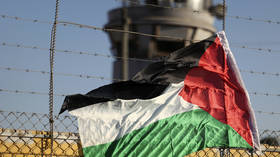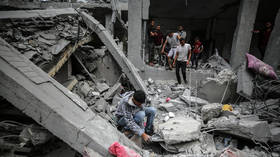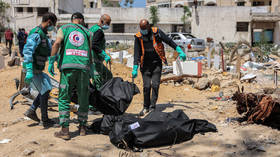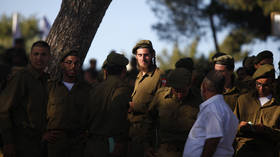Neglect, abuse, torture: The West is ignoring the fate of Palestinians stuck in Israeli jails

For over six months, the world has watched the devastating Israeli campaign against Palestinians in Gaza, which has killed over 34,000 people so far (including over 16,000 children).
Fewer are aware, however, of the nearly 10,000 Palestinians held in Israeli prisons, many of whom have been repeatedly arrested and held for prolonged, indefinite periods. These include children, university students, medics, doctors, and journalists, among others.
While these numbers have increased dramatically in just over half a year, media coverage is scant, with the exception of some reporting on Layan Naser, one of the Christian university students re-imprisoned earlier this month. She was taken by Israeli troops from her family’s home in the early morning, with her parents held at gunpoint. But this is not an isolated phenomenon, she’s just one of many Palestinian students similarly abducted, ostensibly in the name of security, for taking part in campus activism.
On April 7, the Palestinian Commission of Detainees and Ex-Detainees Affairs condemned the latest kidnappings of Layan Kayed and Layan Naser, two young women who have previously been targeted and imprisoned, along with multiple others.
Justifying endless incarceration
The greater issue is that, as of April 17, which is Palestinian Prisoners’ Day, over 9,500 Palestinians are being held in Israeli prisons – roughly one third of whom are imprisoned under what is termed ”administrative detention” – a procedure that allows the Israeli military to hold people based on secret evidence, indefinitely and without trial. Israel justifies it with its Emergency Powers laws, under the constant state of emergency the country has been in since 1948.
Some 3,000 Gazan Palestinians have been detained by Israel since the current war on Gaza started last October – a number revealed by an investigation by Palestinian NGO Al Mezan Center for Human Rights. According to Al Mezan, this includes “women, children, elderly people, as well as professionals such as doctors, nurses, teachers and journalists.”
Out of the estimated 3,000 detainees, 1,650 Gazans are held under the Unlawful Combatants Law – a law similar to administrative detention but specific to Gazan Palestinians. They are also imprisoned without charge or legal representation, suspected of being “unlawful combatants.” They are, Al Mezan notes, “held in total isolation from the outside world” and “are neither granted the status of prisoners of war under the Third Geneva Convention, nor afforded the protections of civilian detainees under the Fourth Geneva Convention.” Another 300 (including ten children) not currently detained under the Unlawful Combatants Law are being imprisoned pending investigation.
Meanwhile, in the West Bank, according to the Commission of Detainees Affairs, as of April 16 8,270 Palestinians have been arrested, including 275 women, 520 children, 66 journalists (with 45 still in custody, 23 of whom are in administrative detention).
Of these, 80 women (not including women from Gaza) and over 200 minors are imprisoned. The total number held under administrative detention is more than 3,660, including more than 40 children.
Since last October 7, 16 West Bank Palestinian captives have died in Israeli prison due to ”systematic measures of torture, medical crimes, the policy of starvation and many other violations and assaults conducted against male and female detainees, minors and elderly detainees,” according to a report by NGO the Palestinian Prisoners’ Society.
Israeli newspaper Haaretz reports 27 Palestinians from Gaza have died since October 7: “The detainees died at the Sde Teiman and Anatot facilities or during questioning in Israeli territory.” The same article refers to a UNRWA report published by The New York Times recently, which states that detainees released to Gaza testified that they were beaten, robbed, stripped and sexually assaulted, and had access to doctors and lawyers denied.
Israeli Guantanamos
Reports of torture of incarcerated Palestinians (including children) have been published over the years, with more emerging in recent months. Israeli rights group B’Tselem notes that “Every year, Israel arrests and detains hundreds of Palestinian minors, while routinely and systemically violating their rights: during the arrest [and] under interrogation.”
In March, the executive director of the Public Committee Against Torture in Israel (PCATI) expressed extreme concern, stating that the nearly 10,000 imprisoned Palestinians is, “a 200% increase from any normal year” and that, since last October, at least 27 Palestinians have died in Israeli prison camps inside Gaza. Prisoners include children and the elderly, including an 82-year-old grandmother.
These detention camps, from what I saw in January 2009 in Gaza, are large areas bulldozed flat, without tents or shelter. Former inmates describe them as “open-air cages,” where prisoners are “handcuffed and blindfolded 24 hours a day.”
There are numerous new testimonies of Palestinians mistreated in Israeli detention. Examples include one elderly man from southern Gaza alleged to have been tortured so badly that his leg became infected and after seven days of medical negligence, had to be amputated. Another 60-year-old man is said to have been held for over 50 days, and beaten severely during that time. Human-rights groups continue to document such accounts and to speak out.
Already in February, organizations like Adalah, HaMoked, Physicians for Human Rights Israel, and the Public Committee Against Torture in Israel, submitted a plea to the UN Special Rapporteur (SR) on torture and other cruel, inhuman or degrading treatment or punishment, “urging the SR to take immediate action to halt the systematic abuse, torture, and ill-treatment of Palestinian prisoners and detainees in Israeli prisons and detention facilities.”
Al Mezan reports visiting 40 Palestinian detainees in Ashkelon and Ofer prisons, whose testimonies include being brutally beaten and deliberately starved as a form of torture and collective punishment. One 19-year-old told Al Mezan that “three of his fingernails were removed with pliers during interrogation” and he was, “handcuffed and bound in stress positions for long periods – three times over three days of interrogation.”
Al Mezan reports all detainees “suffer from acute emaciation, fatigue and back curvature due to being forced to bend their backs and heads while walking,” and that the NGO’s lawyer who spoke with these prisoners stated he had never seen such poor prison conditions in 20 years of working with detainees.
More recently, Haaretz reported on a doctor’s treatment of Palestinians in a field hospital in Israel and of horrific conditions: “Just this week, two prisoners had their legs amputated due to handcuff injuries, which unfortunately is a routine event.” According to him, all patients have all four limbs cuffed and are blindfolded and fed through a straw, meaning “even young and healthy patients lose weight after a week or two of hospitalization.”
Now, compare this situation to cases when similar reports or claims come from a state targeted by Washington for regime change or designated as “rogue” or as an “adversary.” In such cases, the claims are often taken at face value, extrapolated, amplified and widely broadcast. For example, in 2017 Western media latched onto claims of a “slaughterhouse” in the town of Saydnaya, Syria, where there were supposed “mass hangings” by the Syrian government. These accusations were uncritically endorsed by legacy media, despite having numerous fallacies and not being based on primary sources.
As noted at the time, Amnesty International admits that since no photos, videos or concrete testimony exist of Saydnaya Prison, they were forced to devise “unique ways with interactive 3D models and digital technology, animations and audio software” and liaised with West-based NGOs that support efforts to overthrow the Syrian government to craft their report, which gained media traction because it supported the NATO narrative on Syria.
When it comes to Palestinian prisoners and their reports of being tortured, starved, and denied urgently-needed medical care while in Israeli detention or prisons, such level of effort and media coverage is nowhere to be seen – likely because of the political inconvenience this would cause to Washington and its allies.
The statements, views and opinions expressed in this column are solely those of the author and do not necessarily represent those of RT.
















